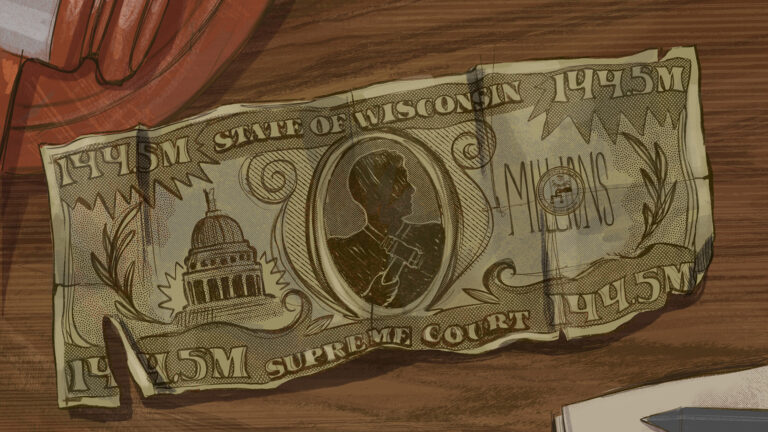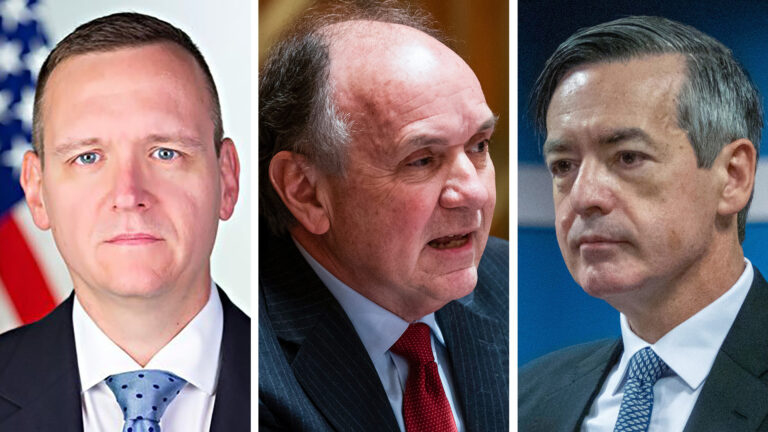Frederica Freyberg:
In other news, as you turn up your thermostat or throw logs on the fire, imagine living and sleeping outside. Hundreds of people experiencing homelessness in Wisconsin are doing just that tonight. In Madison alone, last year, their numbers swell to around 600 by some counts, but this winter about 30 people are newly sheltered from the cold in a new way. They are residing in an encampment of small, but private dwellings the city erected for people who until just recently were living in tents.
Jay Gonstead:
You know you just feel human again.
Frederica Freyberg:
Jay Gonstead welcomed us into his new place.
Jay Gonstead:
This is my bed which is … it’s comfortable.
Frederica Freyberg:
Gonstead has been living in the 8 x 8 shelter for less than a month.
Jay Gonstead:
Here’s my keys. When they handed them to me the day I got here I think that’s what kind of — you know — put me over the edge a little bit.
Frederica Freyberg:
Why?
Jay Gonstead:
Because I knew I was going to be safe.
Frederica Freyberg:
Before being given the keys to his fresh start, Gonstead had lived in a tent in this city park alongside nearly 100 others.
Jay Gonstead:
It was more survival mode. You know, you had to focus on surviving more than living and you know getting back on track.
Frederica Freyberg:
The city helped move 35 people out of the tents to a hotel near the park. 30 more came here where there are bathrooms and hot showers and rows of tiny, heated temporary homes.
Jay Gonstead:
You don’t really realize a warm bathroom, hot shower, heat, electricity, those are actually necessities.
Brenda Konkel:
Those types of things is really, really, really beneficial to folks to be able to think about what their next steps are going to be.
Frederica Freyberg:
Brenda Konkel coordinated with the city to launch the new shelter project, including hiring on-site recovery services for residents.
Sara Allee-Jatta:
This is the first time for a lot of people that somebody has been able to just listen without interruption and people can tell their story. So there is a lot of people that just want to come in and be heard and just talk.
Frederica Freyberg:
Some advocates say the shelter is necessary, but they are still critical.
Joe Volk:
It’s better than a tent, but certainly a government can do better than trying to house people for the winter in 8 x 8 shanties.
Brenda Konkel:
Myself I was probably a little skeptical of the project thinking it was just a band aid.
Frederica Freyberg:
But seeing residents faces light up and smile, Konkel now says it can serve as a model. Another option for people experiencing homelessness. A place Gonstead says he found himself after bad choices, bad luck and bad credit.
Jay Gonstead:
I didn’t ask for this. You know, I didn’t ask for this. Homelessness. I didn’t ask for it.
Frederica Freyberg:
When outreach workers asked him to move from the tent, he says the fear, the pain and the stress melted away.
Jay Gonstead:
You knew you were going to be warm. You knew you were going to be safe here.
Frederica Freyberg:
Donations pour into the site and this day, one was marked for delivery to Jay Gonstead.
Jay Gonstead:
Blankets, towels, silverware.
Frederica Freyberg:
A different measure of warmth from strangers he never knew cared.
Jay Gonstead:
A sign that will be hung up.
Frederica Freyberg:
The city of Madison will spend about $2 million from federal COVID relief funds for the construction and operation of the shelters including on-site services. As for Jay Gonstead, he says he is looking for work and then a permanent home.
Search Episodes
News Stories from PBS Wisconsin

Donate to sign up. Activate and sign in to Passport. It's that easy to help PBS Wisconsin serve your community through media that educates, inspires, and entertains.
Make your membership gift today
Only for new users: Activate Passport using your code or email address
Already a member?
Look up my account
Need some help? Go to FAQ or visit PBS Passport Help
Need help accessing PBS Wisconsin anywhere?

Online Access | Platform & Device Access | Cable or Satellite Access | Over-The-Air Access
Visit Access Guide
Need help accessing PBS Wisconsin anywhere?

Visit Our
Live TV Access Guide
Online AccessPlatform & Device Access
Cable or Satellite Access
Over-The-Air Access
Visit Access Guide
 Passport
Passport


















Follow Us